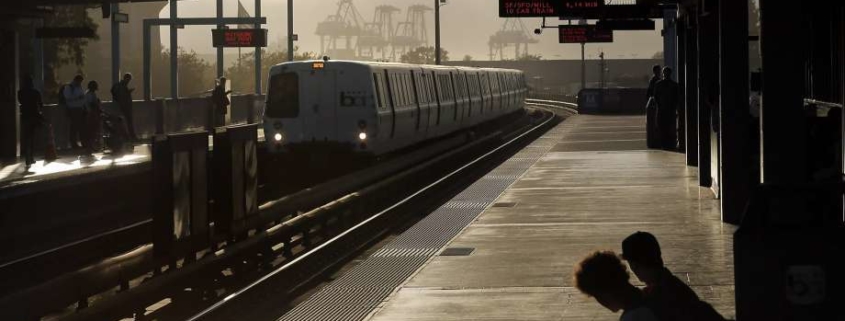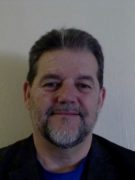Not So Random Thoughts About Light, Dark and Hope
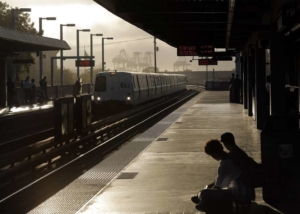 I took BART into San Francisco to do my writing work today. It was late morning so the train was fairly empty. I sat down, pressed my earphones in, and listened to music while I rode from the East Bay into the City. That train line stays above ground for most of the way, dips underground through downtown Oakland and pops back up to the light and into the elevated West Oakland Station with it’s view of the long necked cargo cranes dotting the edge of the port. The train then takes another dive under the bay all the way into downtown San Francisco where I get off. Perhaps it was the in and out from darkness into light that made me think of the word illuminate. Underground, there is nothing but black outside. Only the inside of the train is visible. The windows, like giant dead televisions screens, show nothing but our own reflection.
I took BART into San Francisco to do my writing work today. It was late morning so the train was fairly empty. I sat down, pressed my earphones in, and listened to music while I rode from the East Bay into the City. That train line stays above ground for most of the way, dips underground through downtown Oakland and pops back up to the light and into the elevated West Oakland Station with it’s view of the long necked cargo cranes dotting the edge of the port. The train then takes another dive under the bay all the way into downtown San Francisco where I get off. Perhaps it was the in and out from darkness into light that made me think of the word illuminate. Underground, there is nothing but black outside. Only the inside of the train is visible. The windows, like giant dead televisions screens, show nothing but our own reflection.
Confined by darkness, fear can creep in. I’m reminded of that when I see the solemn faces of those around me: a slim Asian man, wearing dark slacks and a starched rose colored shirt, clutches a Federal Express envelope tight to his chest and his lips move ever so slightly, as if reminding himself of something. A woman, with long hair and sad eyes stares out the window even when there is nothing to see. 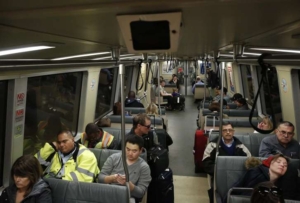 Another man, wearing bicycle shorts and a loose “Osama was a Dodger Fan” tee shirt, holds his bike and struggles to maintain his balance while holding his bike as the train moves. Two construction workers with their lunch pails on their lap, wearing steel toed boots, converse in Spanish. Fortunately neither the train, nor the people in it remain in the dark for long. The train moves fast so that it’s easier to withstand the black, knowing that as long as the train keeps moving, it’ll soon come up again. There is palpable relief in the passenger’s faces when the train surfaces. I can only imagine the effects of what sustained darkness might bring.
Another man, wearing bicycle shorts and a loose “Osama was a Dodger Fan” tee shirt, holds his bike and struggles to maintain his balance while holding his bike as the train moves. Two construction workers with their lunch pails on their lap, wearing steel toed boots, converse in Spanish. Fortunately neither the train, nor the people in it remain in the dark for long. The train moves fast so that it’s easier to withstand the black, knowing that as long as the train keeps moving, it’ll soon come up again. There is palpable relief in the passenger’s faces when the train surfaces. I can only imagine the effects of what sustained darkness might bring.
* * *
There is certain duplicity in the word illuminate. On the one hand, bringing into the light implies acknowledgement and a sense of self-discovery that can lead to a more righteous path. On the other it can mean exposing invisible, often terrible things. Either way, there had been a general lack of light, of illumination, which up to now had made truth elusive. But lately, it’s beginning to feel as if the train is making its way out of the dark. Patriarchy and racism—in all its forms—are just a couple of the truths that have sprung from the shadows that once provided them safe haven, and brought them to light.
Yet truth is malleable. A group of people can witness the same event and describe totally different versions of it. And they’re all true. I attended a talk by Lydia Yuknavich at the Bay Area Book Festival last week and someone asked her just how close to the ‘truth’ her memoir, The Chronology of Water, might have been, and how close does it need to be when writing memoir, historical fiction or even fiction. Her answer was, “We mustn’t be bound by the tyranny of truth.” It’s a compelling statement. She believes our imagination must be free to roam, and we mustn’t be preoccupied by wanting or feeling bound to tell what others perceive to be the ‘true’ story. In the end it is only the truth in the eyes of one, the writer.
We have a tendency to condemn or praise based on our own versions of truth. In these troubled times, we have come to a place where for some, the view of the world has been reduced to us versus them. We fail to understand that as humans, we share the same traits. We all make choices and move forward to live our lives certain in the knowledge that whatever direction taken is justified and right. That is, until we find out we may have been wrong. To admit we might have traveled the wrong path may be perceived as squandering the value of whatever life we’ve lived. It makes it difficult for anyone to admit the error of the decisions they’ve made and relinquish their pride. I know I have that problem. I’m stubborn and it’s difficult for me to admit when I’m wrong. Fortunately, there are those that have the humility and the courage (terms I believe should always be together) to make a correction mid-course.
* * *
The men accused of assault and sexual harassment, sparking the powerful #MeToo movement, found their exposure damning and undesired. It’s their reaction that troubles me. I’ve heard few admissions of guilt or remorse from any of them. Charlie Rose, Harvey Weinstein, Bill Cosby, all seem to be reading carefully prepared statements, probably written by their attorneys, voiced in a half-hearted “I’m-reading-this-because-I-have-to-in-order-to-not-get-sued-or-go-to-jail” voice. I suppose I look at illumination as something that resonates with wisdom gained. I wonder, when I hear these men strain to admit guilt or complicity, whether they’ve gained any such insight. I wonder how many men have stopped to think about their own lives in that context.
On the other hand, not only those who espouse it but also those who oppose it seem glad that the prevalent racism we’re seeing today, is exposed. Bringing the issue to light leaves us with no choice but to confront it. Maybe now we can discuss it openly. I’d say condemn it, as racism in the absolute sense has no redeeming quality, but that declaration avoids open debate. Racism won’t go away by simply declaring it wrong. We can all be blind to our own biases. So it’s important to understand its origins. Those origins can vary widely from person to person. It’s an issue that must be debated one person at a time. Racism is a form of hatred. And that hatred stems from fear, but it can also stem from ignorance. So the question is, what are they afraid of? If they’re simply following the words that previous generations preached, we must ask, why are they unable to challenge those long held opinions? What is it about their constitution that prevents them from simply questioning? Or is it just the result of living in a sustained darkness of mind?
As the train pulls out from the underground tube, it also reminds me of how difficult and traumatic birth is, for all of us. Nothing can prove to be more shocking to a life that has yet to comprehend right from wrong, or developed a consciousness, than to be forcibly pushed out from the womb, into the blinding light. Our first violent experience is anchored on the transition from darkness of the womb to light of the outside world. Newborns scream and cry in fear of the unknown, of that which it has never seen or experienced. When I think about that I imagine their loud cries and screams are like those we hear today in the collision between those people that seek the light, who seek justice and fairness versus those that fight to remain in the shadows. I think that perhaps that might signal a rebirth. A rebirth of our communities, and of our country. At the very least it alerts us of things won’t remain the same, and of the fact that the train will eventually surface and leave the dark behind.
* * *
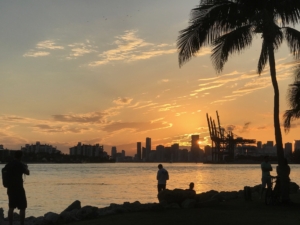 An elderly lady enters the crowded train at Embarcadero Station. A young black man rises from his seat and offers it to her. She smiles, thanks him, and sits down. He smiles back. Seeing that gives me hope that change will be for the better. Everything about us as humans is being laid bare, and we need to recognize ourselves in each other. Only good can come from that, we’re all on the same train after all.
An elderly lady enters the crowded train at Embarcadero Station. A young black man rises from his seat and offers it to her. She smiles, thanks him, and sits down. He smiles back. Seeing that gives me hope that change will be for the better. Everything about us as humans is being laid bare, and we need to recognize ourselves in each other. Only good can come from that, we’re all on the same train after all.
P.S.: This is the last of my blog posts for Lunch Ticket as I move on from this reviving experience that has been the Antioch MFA. I’ve written six posts: about family, about gentrification, about baseball and hurricanes. While today, there is much to fight for and stand up to. I wanted my last piece of writing to reflect the fact that we’re in a time of change, drastic change. But also to remind us not to focus on what divides us, but what binds us as human beings.
For therein lies our hope.
Jesus Francisco Sierra is currently working through a post MFA semester in Fiction at Antioch University Los Angeles. He emigrated from Cuba in 1969 and grew up in San Francisco’s Mission District. He still resides in the San Francisco Bay Area. Although he has been a lifelong writer and storyteller, he makes a living as a structural engineer. His inspiration, and his most supportive audience, are his adult daughter and son. He is fascinated by how transitions, both sought and imposed, have the power to either awaken or suppress the spirit. His work has previously been published in Marathon Literary Review and The Acentos Review.

